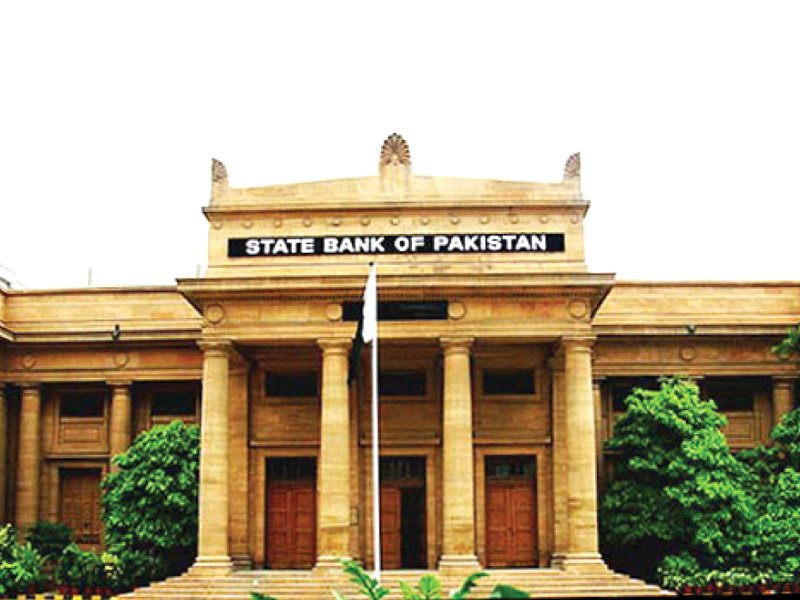
The State Bank of Pakistan seems to have given up considering the finance ministry a rational government body that has made some otherwise inadvisable decisions. It is now almost openly talking about the ministry as one would about a relative with a substance abuse problem.
In keeping with the central bank’s tradition of subversive competence, this little nugget of an exasperated rebuke is buried deep in the middle of an SBP report on the state of the economy during the third quarter of fiscal year 2013. It seems to have been placed, almost on purpose, in a place where hardly anyone would find it: in a section titled “Macroeconomic dynamics with a dominant borrower (government)”.
The section relies on unpublished research conducted by the SBP’s Chief Economic Adviser Mushtaq Khan. It talks about what the State Bank’s options are, considering the finance ministry’s refusal to respond to any of the SBP’s policy measures (though it saves the good stuff for the footnotes, no doubt hoping that nobody in the finance ministry would notice and stop them from being published). It also appears to comprehensively address many of the criticisms that are levelled at the central bank for not doing much to control the behaviour of the finance ministry.

Source: State Bank Of Pakistan
The most often-used criticism is that the central bank should be raising interest rates – not lowering them – to force the government to stop borrowing so much. The report responds to that suggestion by saying: “Price signals often fail in structurally distorted economies. A desperate borrower does not respond to price signals; this is especially the case with addictive goods/services. While increasing interest rates is sufficient to deter an individual from borrowing more, in the case of a government with a short-term horizon, the rising cost of credit will not deter fresh borrowing, but only increase the government’s indebtedness and squeeze the fiscal accounts further.”
In case you missed the subtle slap-on-the-wrist, the State Bank is quite frankly talking about the finance ministry as if it were a drug addict. Well, what about treating this addict by taking away their drugs; in this case, as some people suggest, by absolutely refusing to lend to the government or bouncing their checks that go beyond a certain limit?
The SBP once again has a very forthright answer to that (again in the footnotes): “We dismiss the suggestion that an independent central bank can, and should, impose a hard ceiling on government borrowing to be implemented by bouncing federal government cheques if required. In our view, no central bank may want to take such a course of action, as this would not only seize up the money and currency markets, but could easily trigger a full-blown banking crisis.”

In effect, the finance ministry is an addict that the State Bank has tried to send to rehab several times, but the only thing they seem to be getting is a series of relapses. So, at this point, the SBP is less concerned about the government’s finance health and more concerned with trying to contain the damage to the rest of the economy.
In 2011, the public sector overtook the private sector as the dominant borrower, accounting for a majority of loans outstanding the country’s commercial banking system, which accounts for the overwhelming bulk of the country’s financial system. Ironically, the more the government’s borrowing crowds out investment and slows down economic growth, the more risk-averse banks become and the more they are inclined to lend even more to the government – a vicious cycle that the SBP appears to admit it has no way of breaking.
The SBP’s econometric models suggest that raising interest rates would only further increase the likelihood of an economic crisis, and that the central bank’s best bet of averting – or at least delaying – disaster is to lower interest rates. Nonetheless, this is not a sustainable solution, and the State Bank admits as much. The report, however, is disturbingly short on ideas about how this ends.
Published in The Express Tribune, June 16th, 2013.
Like Business on Facebook to stay informed and join in the conversation.
COMMENTS (14)
Comments are moderated and generally will be posted if they are on-topic and not abusive.
For more information, please see our Comments FAQ




1719660634-1/BeFunky-collage-nicole-(1)1719660634-1-165x106.webp)












@sgrr: Well, at least you have the courtesy to respond and accept my facts etc., Thanks. But the other guy who thinks he is Mr. Know-it-All ex-bureaucrat, didn't even respond to acknowledge the facts. That's why he was a no-good bureaucrat and hopefully you will become a prosperous shop owner one day. Good luck.
@Billoo Bhaya: Certainly you are right. Basically you write your comments by sitting in cold drawing rooms lloking at the published figures based on air, while I used to shop my households myself every week like millions of Pakistani, and feel the heat of rising cost of living each and every day and do not look at the figures.
@sgrr: Do you make statements without thinking?? No brain matter I guess like millions of our fellow citizens.
Pakistan has reached this monetary cliff because of the inept attitude of itscentral bank i.e., State Bank of Pakistan. During the past 5 years, SBP has been run (or destroyed) by 4 insecure Governors who had to quit their job because they had no guts to bounce any cheque of the then Government. The incumbent Governor Yaseen Anwar is clinging to his job not because of his competency or ability to say "No" to the Government but only because he is a "US citizen" and any bureaucrat sitting in the Ministry of Finance will have to think twice before touching the US citizen.
@meekal a ahmed: You didn't think I was BSing???
@meekal a ahmed: Also see page 92 and Table 7.2: Source: Pakistan Bureau of Statistic of Pakistan Economic Survey. Click below: http://cdn.onepakistan.com/content/2013/budget/Inflation.pdf
Last Para reads: Inflation 2012-13 Consumer price inflation maintained a downward trend during most of the first ten months (July-Apr) of current fiscal year 2012-13. It averaged 7.8 percent against corresponding increase of 10.8 percent. The food with weight of 34.8 percent and non-food having weight 65.2 declined and stood at 6.6 percent and 8.5 percent respectively, due to better supply position whereas core inflation which is nonfood-non energy is estimated at 9.9 percent. With slow growth in food and energy prices, inflation is expected to average 8.0 percent by end of 2012-13.
@meekal a ahmed: Dr Hafiz Pasha says in today's article: "a major concern for the coming year is that inflation may be back once again to a double-digit rate due to the large monetary overhang". Plus in prior year SBP reports that I read except in 1 out of 5 years did it breach double digit. Read full article by Pasha by clicking below: http://www.thenews.com.pk/Todays-News-9-184064-An-ambitious-budget
@meekal a ahmed: Sir You are very well right, but too late to point out this.
"....inflation has remained tame at less than 8% for the past five years"
Where did this come from?
Unfortunately, the department which releases this report and the head of this department i.e. chief economic adviser just wants to come in the limelight. I think their analysis is shallow and not very clear! The Chief Economic Adviser is a biased guy and wants to damage the reputation of SBP and the Governor (who stopped him from taking oath as care taker finance minister)
Farooq Tirmizi: Good investigative stuff. PPP's Min of Finance were many and were masters of deficit financing, which is what SBP and you allude to. However, I don't understand inflation numbers FBS and SBP have been quoting. According to econometric models, when there is nearly 9% fiscal deficit, a huge trade deficit, negative FDI, then how can inflation remain tame at less than 8% for nearly past 5 years?? You can see how the country's $:Rupee parity has shifted from 60 to nearly 100, reflecting the fiscal deficit. Why has inflation remained so tame?? Or is a galloping one coming and when??
This is one of the most worrying articles I have read. SBP has very competent management, and one that is brave enough to call a spade a spade. Unfortunately, it seems that they are no more optimistic about the financial future of Pakistan despite the new government.
Good catch Farooq. The Fund has been saying this for quite some time. Apparantly, this is a result of both a socialist ex-President, and then some incompetant staff at the Ministry who had the political clout to silence the views of the more technically sound staff